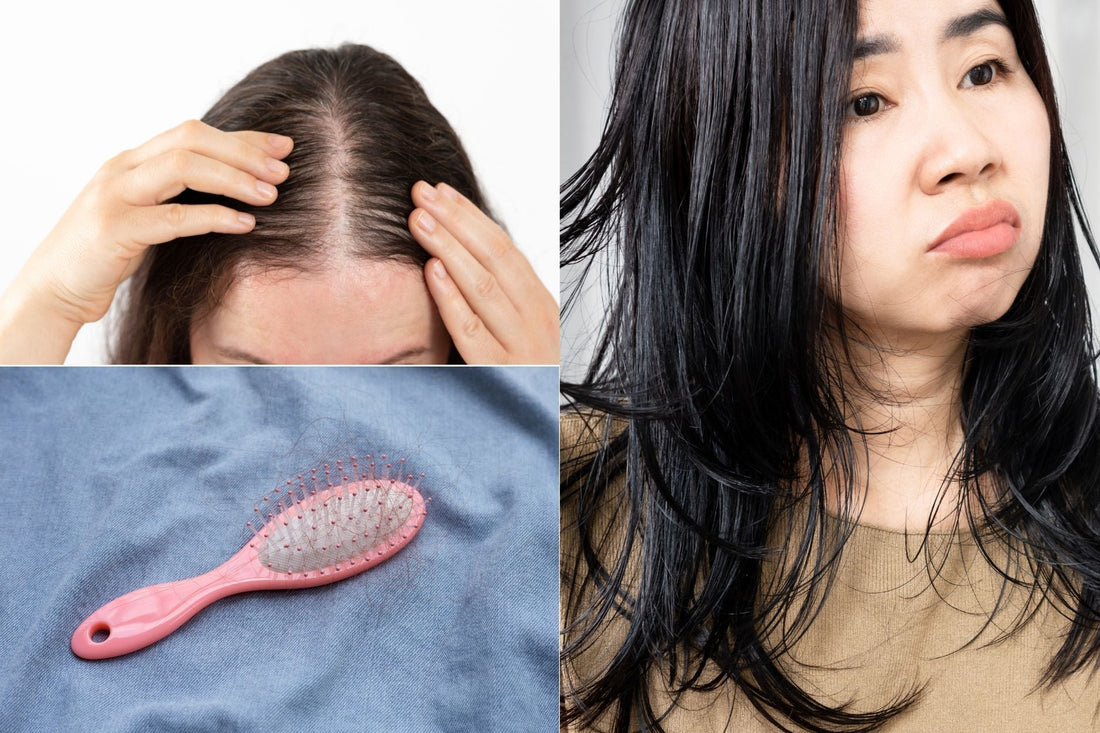Is Stress or Hormonal Change Behind Your Hair Fall? Find Out Here!
Have you noticed extra hair on your pillow, in the shower, or while brushing? It might feel like your hair is falling out for no reason — but often, the real reasons are hiding in plain sight. Two of the most common causes of hair fall are stress hormonal changes.
In this blog, we’ll explain how stress and hormones affect your hair, the signs to look out for, and how to manage hair fall naturally — with simple homemade remedies and easy lifestyle changes
How Stress Causes Hair Fall
When your body goes through physical or emotional stress — like lack of sleep, anxiety, illness, or major life events — it can affect your hair’s natural growth cycle. This leads to a condition called telogen effluvium, where a large number of hair strands shift into the resting phase and fall out after a few weeks
Common stress triggers
- Job pressure or emotional burnout
- Family or relationship issues
- Poor sleep and overthinking
- Crash diets or weight loss
Good news: Hair fall from stress is usually temporary and can be reversed by reducing stress and improving overall health.
How Hormonal Changes Lead to Hair Fall
Your hormones control everything from your energy levels to your hair growth. When there’s an imbalance, it can lead to hormonal hair fall, often seen in women during:
- Thyroid issues – Hypothyroidism and hyperthyroidism both affect hair growth.
- PCOS (Polycystic Ovary Syndrome) – Causes hormonal imbalance, leading to thinning hair and hair fall at the crown or sides.
- Pregnancy & Postpartum – Hair may grow well during pregnancy due to high estrogen, but fall heavily after childbirth when hormone levels drop.
- Menopause – Decreased estrogen and progesterone can cause thinner, drier hair.
If you’re experiencing any of the above, your hair fall due to hormonal changes might need both internal and external care.
Signs You’re Losing Hair Due to Stress or Hormones
It’s not always easy to tell the cause, but here are some common signs:
- Sudden hair shedding in clumps
- Hair thinning near the hairline or crown
- Changes in periods, weight, or skin
- Mood swings, tiredness, or lack of sleep
- Increased breakouts or facial hair (common in PCOS)
If these sound familiar, it’s time to take a closer look at your health — not just your hair.
Natural Remedies to Control Hair Fall from Stress or Hormonal Imbalance
Let’s dive into what you can do to reduce hair fall naturally and nourish your scalp from the inside out. > Curry Leaves Massage

Why it works:
Coconut oil deeply nourishes the scalp, while curry leaves are rich in antioxidants and strengthen hair roots.
How to use:
Take 2 tablespoons of coconut oil. Add 10–12 fresh curry leaves Heat until the leaves turn dark. Let it cool and massage into your scalp Leave for 1 hour or overnight, then wash with mild shampoo
Use this oil twice a week to reduce breakage and boost hair growth.
Amla & Fenugreek Hair Mask
Why it works:
Amla (Indian gooseberry) is rich in vitamin C, which boosts collagen, while fenugreek (methi) strengthens hair from the root.
How to use:
Soak 1 tablespoon of fenugreek seeds overnight Grind into a paste and mix with 1 tablespoon amla powder Add a little yogurt or water to make a smooth mask Apply to scalp and hair, leave for 30–40 minutes, rinse with water
Use weekly to reduce hormonal hair fall and promote growth.
Destress With Simple Habits, Stress management is key.
Try these natural methods to calm your body and mind:
Deep breathing for 5–10 minutes daily
- Short walks or yoga
- Listening to calming music or spending time in nature
- Journaling or unplugging from screens before bed
- Getting 7–8 hours of sleep every night
A calm mind = healthier hair.
Eat Hormone-Balancing Foods

Your hair reflects what you eat. For stronger hair and balanced hormones, include:
Leafy greens: spinach, kale
Nuts & seeds: flaxseeds, almonds, sunflower seeds:
eggs, dal, paneer, lean meats: pumpkin seeds, lentils, chickpeas
Biotin-rich foods: sweet potatoes, bananas, avocado
Stay hydrated with 6–8 glasses of water daily. Hydration helps your scalp too! Sip Herbal Teas.
Certain herbal teas can help balance hormones and reduce stress:
- Spearmint tea (great for PCOS)
- Chamomile tea (for better sleep and stress relief)
- Ashwagandha tea(natural adaptive to calm stress)
Drink 1–2 cups daily, but consult your doctor if you’re pregnant or on medication.
Final Thoughts
Hair fall due to stress or hormonal changes can be scary — but it’s not permanent. By understanding the root cause, making simple lifestyle changes, and using natural remedies, you can regain control over your hair health.
Be patient with your hair, be kind to yourself, and let your body heal. Beautiful hair begins from within!































